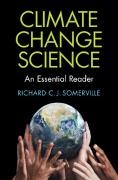En savoir plus
Written by an established climate change scientist, this book introduces readers to cutting-edge climate change science. Unlike many books on the topic that devote themselves to recent events, this volume provides a historical context and describes early research results as well as key modern scientific findings. It explains how the climate change issue has developed over many decades, how the science has progressed, how diplomacy has (so far) proven unable to find a means of limiting global emissions of heat-trapping substances, and how the forecast for future climate change has become more worrisome. A scientific or mathematical background is not necessary to read this book, which includes no equations, jargon, complex charts or graphs, or quantitative science at all. Anyone who can read a newspaper will understand this book. It is ideal for introductory courses on climate change, especially for non-science major students.
Table des matières
Preface; Part I. Eight Articles from the Bulletin of the Atomic Scientists: Chapter 1. Reflections on the UN Climate Change Negotiations in Bali; Chapter 2. The Passing of a Climate Prodigy; Chapter 3. Climate Change, Irreversibility, and Urgency; Chapter 4. Climate Change and the 2016 Election; Chapter 5. How to Deal with Climate Change Denying Uncle Pete; Chapter 6. Wildfires and Climate Change; Chapter 7. Facts and Opinions About Climate Change; Chapter 8. Weaning a House and the World from Fossil Fuels: Lessons Learned; Part II. Understanding and Communicating Climate Change Science: Chapter 9. Preparation; Chapter 10. Stories; Chapter 11. Language; Chapter 12. Solutions; Part III. Scientific Investigations of the Climate System: Chapter 13. The Greenhouse Effect; Chapter 14. The Keeling Curve; Chapter 15. The Temperature Record; Chapter 16. Climate in the Future; Chapter 17. Numerical Weather Prediction; Chapter 18. Modeling the Climate System; Chapter 19. Climate Feedbacks; Chapter 20. Predictability; Chapter 21. How Climate Models Work; Chapter 22. The Sixth Assessment Report of the IPCC; Part IV. The Future: Chapter 23. If I Were President: A Climate Change Speech.
A propos de l'auteur
Richard C. J. Somerville is Distinguished Professor Emeritus at Scripps Institution of Oceanography, University of California, San Diego. He is a fellow of three scientific societies: the American Association for the Advancement of Science (AAAS), the American Geophysical Union (AGU), and the American Meteorological Society (AMS). He has received awards from the AMS for his research and his popular book The Forgiving Air: Understanding Environmental Change. From the AGU, he has received two major honors: the Climate Communication Prize (2015) and the Ambassador Award (2017). Richard is co-author (with Sam Shen) of Climate Mathematics: Theory and Applications (2019, Cambridge University Press) and co-editor of The Development of Atmospheric General Circulation Models: Complexity, Synthesis and Computation (2018, Cambridge University Press).

